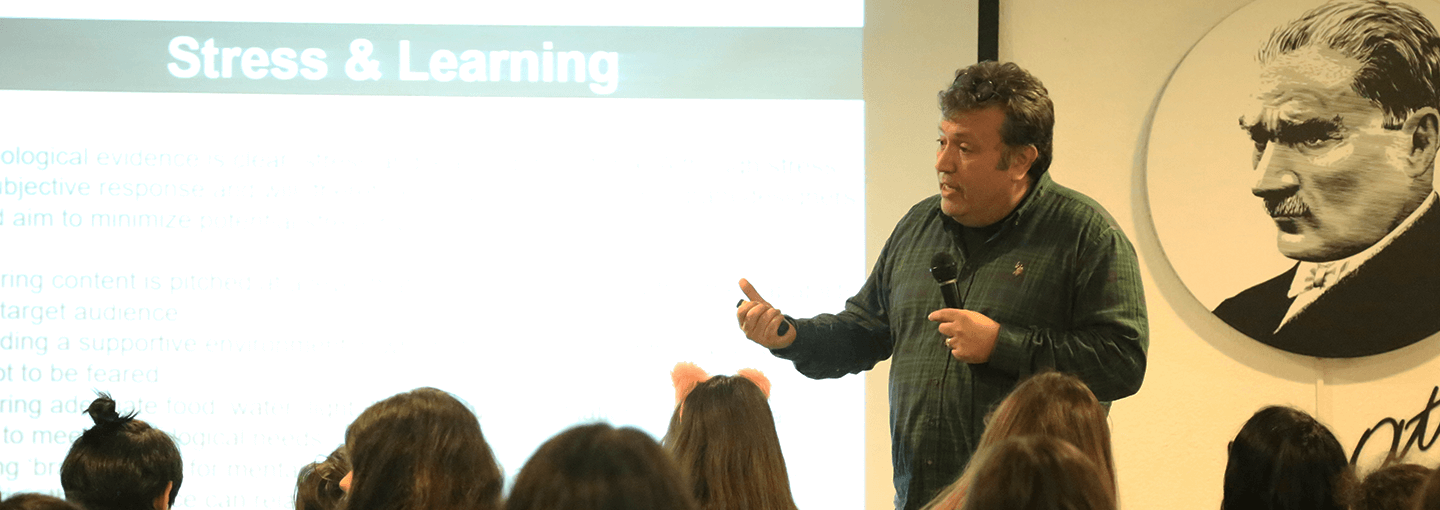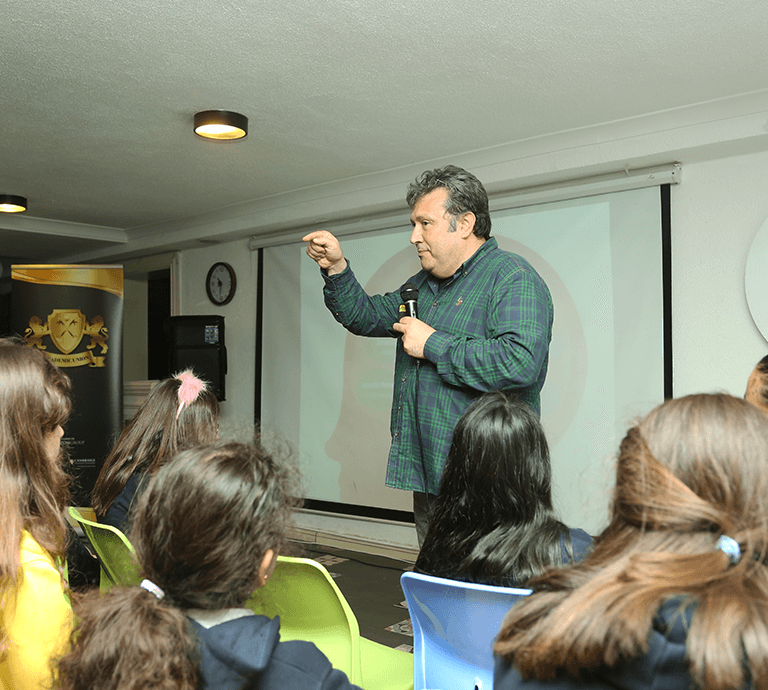ODTÜ'den Prof. Soner Yıldırım (Akademic Union üyesi), AU'nun organize ettiği öğrenme faktörleri üzerine TBS öğrenci ve öğretmenlerine akademik bir seminer verdi.
TBS Orta ve Lise öğrencilerine verdiği seminerde Prof. Yıldırım; öğrenmenin tanımı, öğrenmenin aşamaları, beynin öğrenme sürecinde nasıl davrandığı, zekanın ne anlama geldiği konularından bahsederek, daha iyi öğrenme ve ezberleme için önemli ipuçları verdi.
“Herkesin ve her beynin kendine özgü öğrenme alışkanlıkları vardır” diyen Prof. Yıldırım ve her beyin “not alma, tekrarlama, çizme, yazma, dinleme, izleme ve gözlemlemeye tepki verir. "Bu koşullar öğrenme sürecinde her beyin için farklı şekilde uygulanır”. diyerek sözlerine devam etti.
Prof. Dr. Yıldırım: Kanımızın kalitesinin öğrenmede büyük rolü var. Kan; oksijen, beslenme, glukoz ve diğer içerikler öğrenme sürecini doğrudan etkileyen faktörlerdir. Beynimiz günde 1000 litreden fazla kan kullanıyor.
“Beyni harekete geçirmek için egzersiz yapın!” - Prof. Soner Yıldırım (Orta Doğu Teknik Üniversitesi)
Seminerin İçeriği: (The Seminar Programme featured)
- How brain functions on the learning process:
- Neosinaps
- Neurons: A single neuron can achieve nothing - it takes many thousands combined to generate every action, thought or memory we have. Neurons therefore, need to relate to other neurons. They achieve this by sending electrical signals along their axon, which, upon reaching a threshold, release neurochemicals into the gap, or synapse, between two neurons.
- If the dendrites of the receiving neuron have the appropriate chemical receptors, a connection will be formed that results in the receiving neuron firing its own electrical charge, which will be received by yet another neuron and, so, on goes the flow.
- Attention
- Attention requires focused concentration and is a prerequisite for neurons to be activated and neural networks to be forged. Forging new networks is energy-intensive and our brains are not designed to remain attentive for long periods of time. The brain needs down-time at regular intervals to rest and refocus. During this time, it is also strengthening the newly-formed connections. When we push ourselves to focus beyond our natural limits, our concentration wanes, which is our brain’s way of forcing a break and we catch ourselves daydreaming.
- When we pay attention, memories are formed, stored and recalled in a complex process that engages numerous regions of the brain. Without memory, there is no learning.
- Memory is typically described as a three-part process of encoding, storage and retrieval. Incoming data is held in short term, or working, memory and will be quickly lost if not consolidated. How well we encode a memory is critical to how effectively we will be able to recall it at a future point. Failure to learn can be a function of shortcomings at any of the three stages in the memory process.
- Neosinaps
- Under what conditions are learning outcomes optimized?
- Holistic learning recognizes that the brain not only interacts with incoming information, but with the entire context in which it is presented. To this end, our learning environment must address the physical, cognitive and emotional elements in that environment.
- Physical
- Nutrition, blood, oxygen, glucose etc.
Sleep
- Nutrition, blood, oxygen, glucose etc.
- Cognitive
- Exercising our cognitive ‘muscle’ by building more and advanced neural networks is core to our mental fitness and also acts as a barrier to cell atrophy in later life.
- Emotional
- Emotions are integral to thinking and learning.
- Stress
- The biological evidence is clear: stress and learning do not mix. Although stress is a subjective response.
- The biological evidence is clear: stress and learning do not mix. Although stress is a subjective response.
- Physical
- Holistic learning recognizes that the brain not only interacts with incoming information, but with the entire context in which it is presented. To this end, our learning environment must address the physical, cognitive and emotional elements in that environment.
- Intelligence
- Several themes in contemporary understandings of intelligence:
- Factor theories (Spearman, Guildford, Cattell, Thurstone, Carroll, Gardner);
- Cognitive processing (Binet and Terman, Wechsler, Cattell, Sternberg);
- Adaptation to the environment (Binet, Wechsler, Sternberg, Gardner);
- Relationship to culture (Binet, Sternberg, Gardner).
- The sources of intelligence: nature or nurture?
- Nature, parenting, school?
- Several themes in contemporary understandings of intelligence:















